#in human history.
Explore tagged Tumblr posts
Text
Bruce being so smiley and happy around Robin! Jason shatters me so intimately. Soft as hell if this continues when Jason’s red hood, too.
“Robin,” Bruce calls him that out of habit and isn’t at all surprised when Jason swiftly punches his arm, only to rub the place a moment later, even if Bruce barely notices. “This is not the time for jokes.”
“ Three o’clock is always the time for jokes. You scheduled it.”
“Nightwing was turned into a rabbit. And you’re laughing.”
“Have you seen the guy’s Tik Toks? This is as dignified as he’ll ever be.”
Jason is very sure Dick can understand them, because he’s biting hard through his boots. Even harder when Bruce snorts and presses his lips in a white line.
Don’t get me wrong, thought, it’s vice versa.
“I think we’re gonna have to kill this guy, B.” Talking about a guy who cut the line in Batburger while Cass was trying to order.
Bruce, in his Batman voice, “fuck!”
Jason has one of those laughing fits where you get on the floor, breathless and limp. “This brings up memories.”
“ROBIN.”
#I know it in my heart Bruce and Jason have a special look where they make fun of people together#in a very mother daughter way. anyway I just want others to be freaked out by batman giggling quietly after red hood made the worst joke#in human history.#I love them#bruce wayne#dc#dc comics#jason todd#batdad#batman#text#batfamily
6K notes
·
View notes
Text
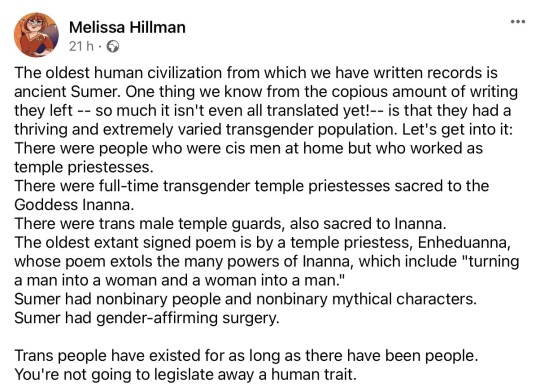
EDITED TO ADD: Sources from the OP in the comments
#trans#nonbinary#trans nonbinary#ancient history#sumer#gender#we have always been here#historical trans people#you cannot legislate us away and you cannot wipe us out while humanity still exists#we are as perennial as the grass#inanna#trans is sacred
46K notes
·
View notes
Text

to be understood!
#redraw#garabatos#the owl house#toh#luz noceda#artists on tumblr#top lines in human history ever i swear to god shes just like kid me fr#one of my favorite things from last year i made#eyestrain
11K notes
·
View notes
Text
I was meeting a client at a famous museum’s lounge for lunch (fancy, I know) and had an hour to kill afterwards so I joined the first random docent tour I could find. The woman who took us around was a great-grandmother from the Bronx “back when that was nothing to brag about” and she was doing a talk on alternative mediums within art.
What I thought that meant: telling us about unique sculpture materials and paint mixtures.
What that actually meant: an 84yo woman gingerly holding a beautifully beaded and embroidered dress (apparently from Ukraine and at least 200 years old) and, with tears in her eyes, showing how each individual thread was spun by hand and weaved into place on a cottage floor loom, with bright blue silk embroidery thread and hand-blown beads intricately piercing the work of other labor for days upon days, as the labor of a dozen talented people came together to make something so beautiful for a village girl’s wedding day.
What it also meant: in 1948, a young girl lived in a cramped tenement-like third floor apartment in Manhattan, with a father who had just joined them after not having been allowed to escape through Poland with his pregnant wife nine years earlier. She sits in her father’s lap and watches with wide, quiet eyes as her mother’s deft hands fly across fabric with bright blue silk thread (echoing hands from over a century years earlier). Thread that her mother had salvaged from white embroidery scraps at the tailor’s shop where she worked and spent the last few days carefully dying in the kitchen sink and drying on the roof.
The dress is in the traditional Hungarian fashion and is folded across her mother’s lap: her mother doesn’t had a pattern, but she doesn’t need one to make her daughter’s dress for the fifth grade dance. The dress would end up differing significantly from the pure white, petticoated first communion dresses worn by her daughter’s majority-Catholic classmates, but the young girl would love it all the more for its uniqueness and bright blue thread.
And now, that same young girl (and maybe also the villager from 19th century Ukraine) stands in front of us, trying not to clutch the old fabric too hard as her voice shakes with the emotion of all the love and humanity that is poured into the labor of art. The village girl and the girl in the Bronx were very different people: different centuries, different religions, different ages, and different continents. But the love in the stitches and beads on their dresses was the same. And she tells us that when we look at the labor of art, we don’t just see the work to create that piece - we see the labor of our own creations and the creations of others for us, and the value in something so seemingly frivolous.
But, maybe more importantly, she says that we only admire this piece in a museum because it happened to survive the love of the wearer and those who owned it afterwards, but there have been quite literally billions of small, quiet works of art in billions of small, quiet homes all over the world, for millennia. That your grandmother’s quilt is used as a picnic blanket just as Van Gogh’s works hung in his poor friends’ hallways. That your father’s hand-painted model plane sets are displayed in your parents’ livingroom as Grecian vases are displayed in museums. That your older sister’s engineering drawings in a steady, fine-lined hand are akin to Da Vinci’s scribbles of flying machines.
I don’t think there’s any dramatic conclusions to be drawn from these thoughts - they’ve been echoed by thousands of other people across the centuries. However, if you ever feel bad for spending all of your time sewing, knitting, drawing, building lego sets, or whatever else - especially if you feel like you have to somehow monetize or show off your work online to justify your labor - please know that there’s an 84yo museum docent in the Bronx who would cry simply at the thought of you spending so much effort to quietly create something that’s beautiful to you.
#shut up e#long post#Saturday thoughts#this has been in my drafts for a week haha#also this is the heart of why AI art feels so wrong#forget the discussion of copyright and theft etc - even if models were only trained on public domain they would still feel very wrong#because they’re not art. art is the labor of creation#even commercial art and art commissioned by the popes and kings of history: there is humanity in the labor of it#unrelated: I did not know living in the Bronx was now something to brag about. How the fuck do y’all New Yorkers afford this city???
28K notes
·
View notes
Text
Women's Not So Distant History
This #WomensHistoryMonth, let's not forget how many of our rights were only won in recent decades, and weren’t acquired by asking nicely and waiting. We need to fight for our rights. Here's are a few examples:

📍 Before 1974's Fair Credit Opportunity Act made it illegal for financial institutions to discriminate against applicants' gender, banks could refuse women a credit card. Women won the right to open a bank account in the 1960s, but many banks still refused without a husband’s signature. This allowed men to continue to have control over women’s bank accounts. Unmarried women were often refused service by financial institutions entirely.
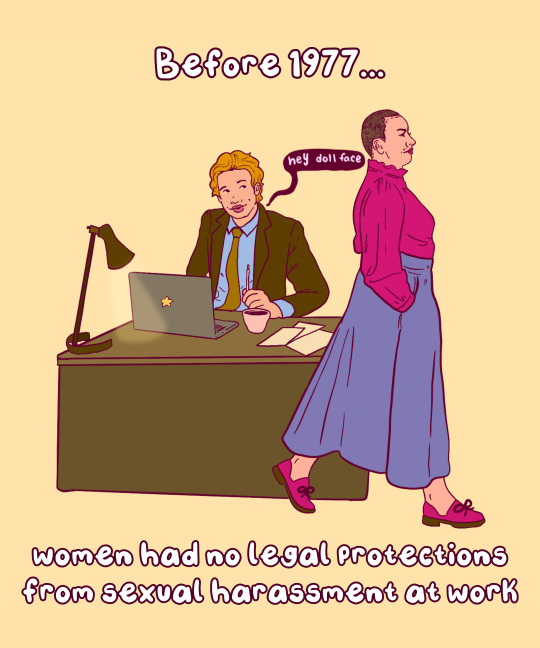
📍 Before 1977, sexual harassment was not considered a legal offense. That changed when a woman brought her boss to court after she refused his sexual advances and was fired. The court stated that her termination violated the 1974 Civil Rights Act, which made employment discrimination illegal.⚖️
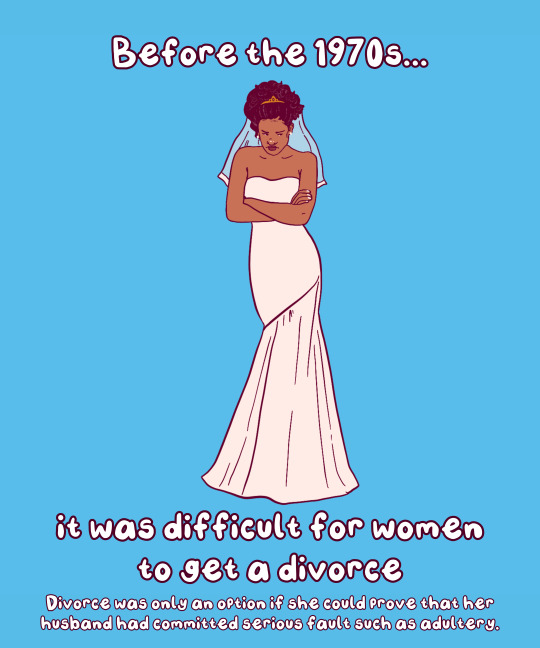
📍 In 1969, California became the first state to pass legislation to allow no-fault divorce. Before then, divorce could only be obtained if a woman could prove that her husband had committed serious faults such as adultery. 💍By 1977, nine states had adopted no-fault divorce laws, and by late 1983, every state had but two. The last, New York, adopted a law in 2010.
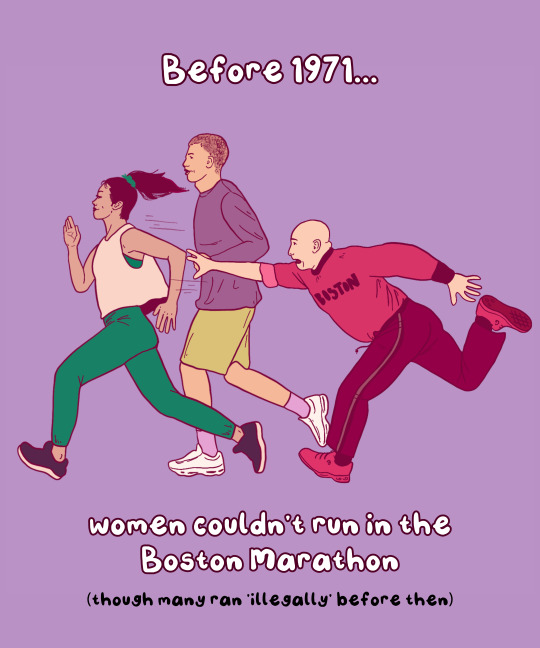
📍In 1967, Kathrine Switzer, entered the Boston Marathon under the name "K.V. Switzer." At the time, the Amateur Athletics Union didn't allow women. Once discovered, staff tried to remove Switzer from the race, but she finished. AAU did not formally accept women until fall 1971.

📍 In 1972, Lillian Garland, a receptionist at a California bank, went on unpaid leave to have a baby and when she returned, her position was filled. Her lawsuit led to 1978's Pregnancy Discrimination Act, which found that discriminating against pregnant people is unlawful
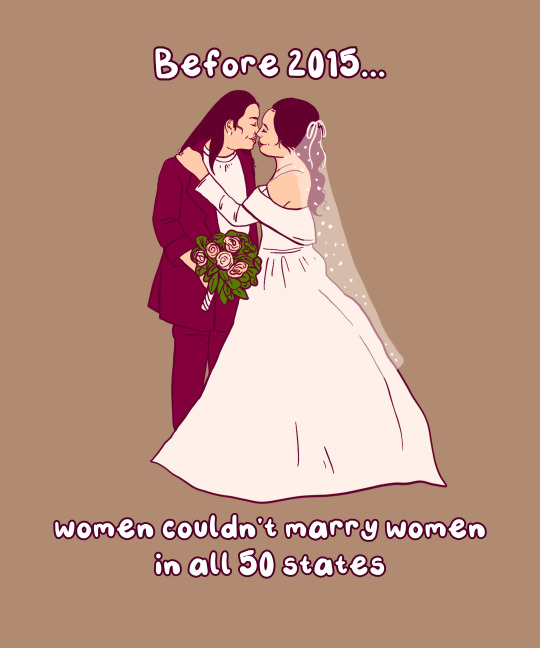
📍 It wasn’t until 2016 that gay marriage was legal in all 50 states. Previously, laws varied by state, and while many states allowed for civil unions for same-sex couples, it created a separate but equal standard. In 2008, California was the first state to achieve marriage equality, only to reverse that right following a ballot initiative later that year.

📍In 2018, Utah and Idaho were the last two states that lacked clear legislation protecting chest or breast feeding parents from obscenity laws. At the time, an Idaho congressman complained women would, "whip it out and do it anywhere,"
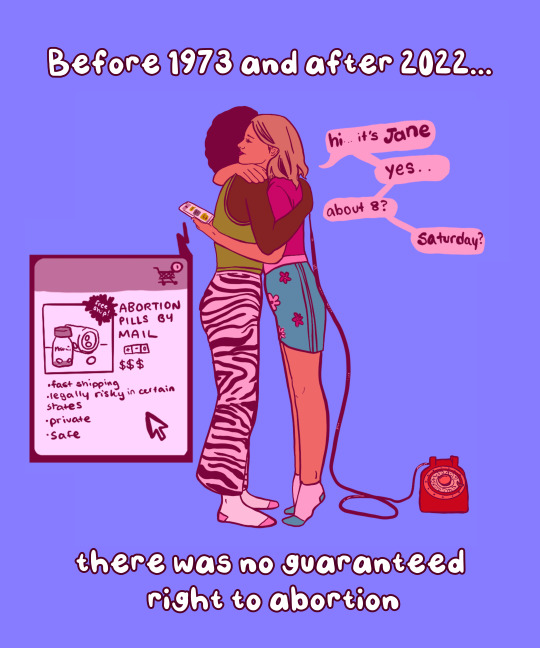
📍 In 1973, the Supreme Court affirmed the right to safe legal abortion in Roe v. Wade. At the time of the decision, nearly all states outlawed abortion with few exceptions. In 1965, illegal abortions made up one-sixth of all pregnancy- and childbirth-related deaths. Unfortunately after years of abortion restrictions and bans, the Supreme Court overturned Roe in 2022. Since then, 14 states have fully banned care, and another 7 severely restrict it – leaving most of the south and midwest without access.
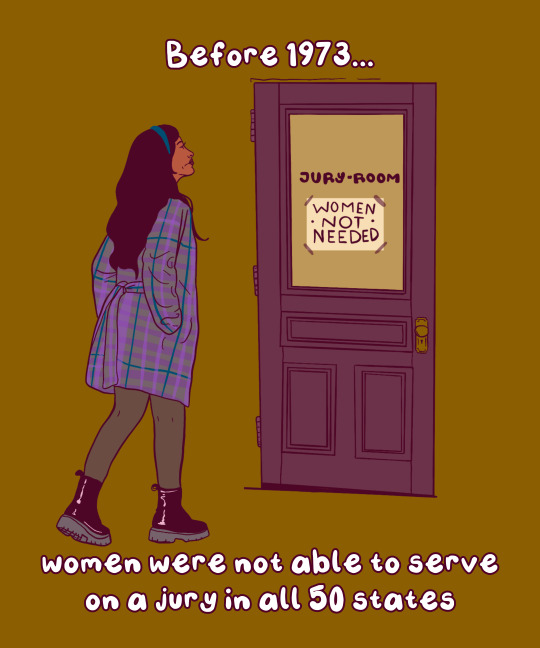
📍 Before 1973, women were not able to serve on a jury in all 50 states. However, this varied by state: Utah was the first state to allow women to serve jury duty in 1898. Though, by 1927, only 19 states allowed women to serve jury duty. The Civil Rights Act of 1957 gave women the right to serve on federal juries, though it wasn't until 1973 that all 50 states passed similar legislation

📍 Before 1988, women were unable to get a business loan on their own. The Women's Business Ownership Act of 1988 allowed women to get loans without a male co-signer and removed other barriers to women in business. The number of women-owned businesses increased by 31 times in the last four decades.
Free download
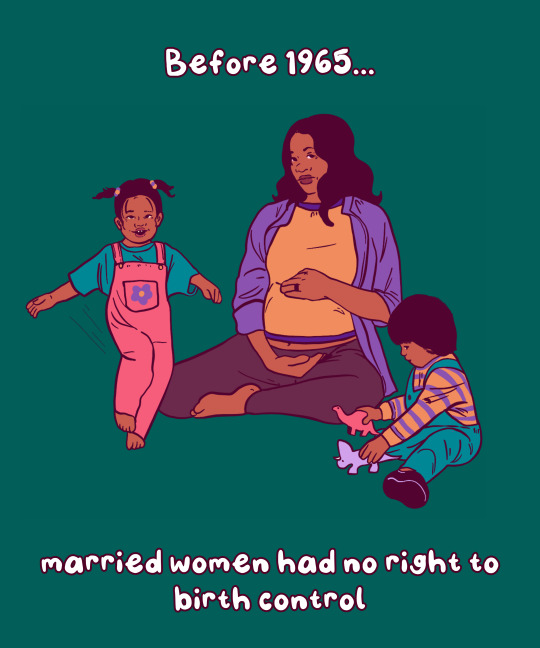
📍 Before 1965, married women had no right to birth control. In Griswold v. Connecticut (1965), the Supreme Court ruled that banning the use of contraceptives violated the right to marital privacy.
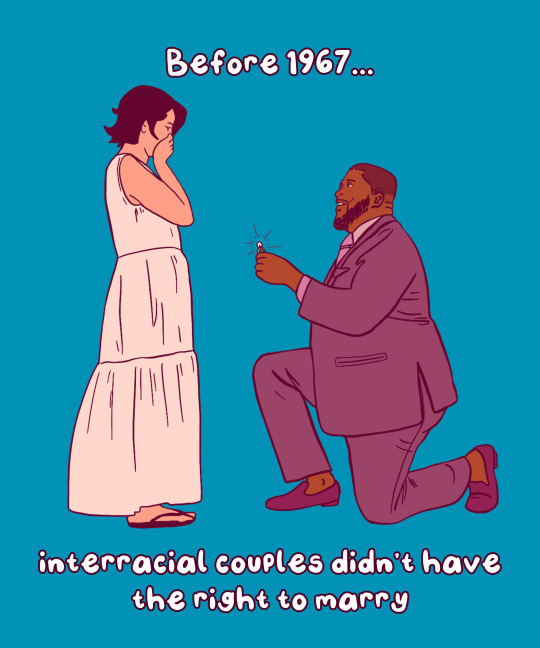
📍 Before 1967, interracial couples didn’t have the right to marry. In Loving v. Virginia, the Supreme Court found that anti-miscegenation laws were unconstitutional. In 2000, Alabama was the last State to remove its anti-miscegenation laws from the books.

📍 Before 1972, unmarried women didn’t have the right to birth control. While married couples gained the right in 1967, it wasn’t until Eisenstadt v. Baird seven years later, that the Supreme Court affirmed the right to contraception for unmarried people.
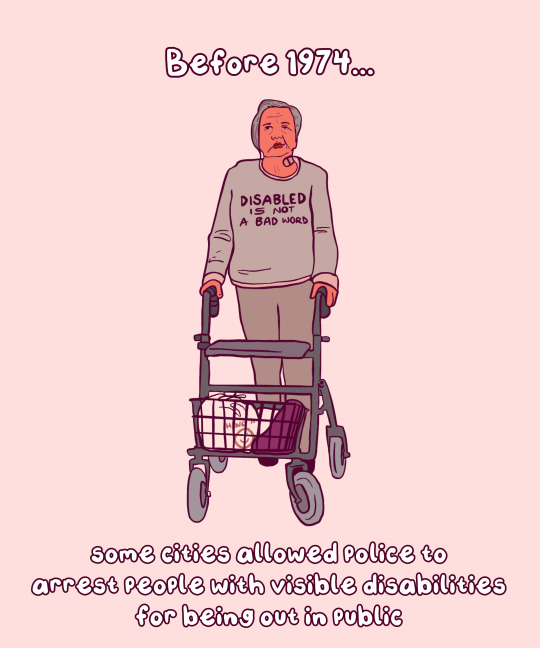
📍 In 1974, the last “Ugly Laws” were repealed in Chicago. “Ugly Laws” allowed the police to arrest and jail people with visible disabilities for being seen in public. People charged with ugly laws were either charged a fine or held in jail. ‘Ugly Laws’ were a part of the late 19th century Victorian Era poor laws.

📍 In 1976, Hawaii was the last state to lift requirements that a woman take her husband’s last name. If a woman didn’t take her husband’s last name, employers could refuse to issue her payroll and she could be barred from voting.

📍 It wasn’t until 1993 that marital assault became a crime in all 50 states. Historically, intercourse within marriage was regarded as a “right” of spouses. Before 1974, in all fifty U.S. states, men had legal immunity for assaults their wives. Oklahoma and North Carolina were the last to change the law in 1993.
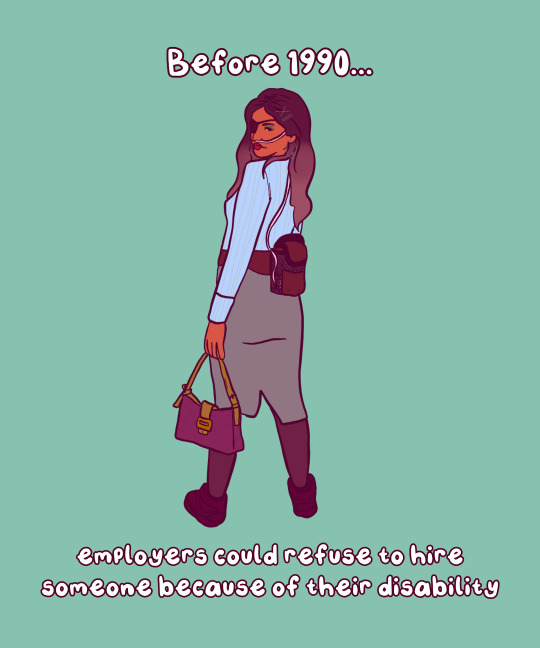
📍 In 1990, the Americans with Disability Act (ADA) – most comprehensive disability rights legislation in U.S. history – was passed. The ADA protected disabled people from employment discrimination. Previously, an employer could refuse to hire someone just because of their disability.
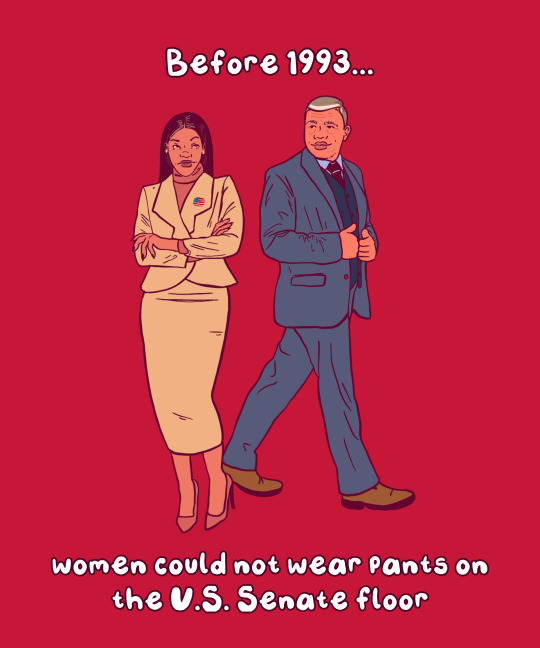
📍 Before 1993, women weren’t allowed to wear pants on the Senate floor. That changed when Sen. Moseley Braun (D-IL), & Sen. Barbara Mikulski (D-MD) wore trousers - shocking the male-dominated Senate. Their fashion statement ultimately led to the dress code being clarified to allow women to wear pants.

📍 Emergency contraception (Plan B) wasn't approved by the FDA until 1998. While many can get emergency contraception at their local drugstore, back then it required a prescription. In 2013, the FDA removed age limits & allowed retailers to stock it directly on the shelf (although many don’t).
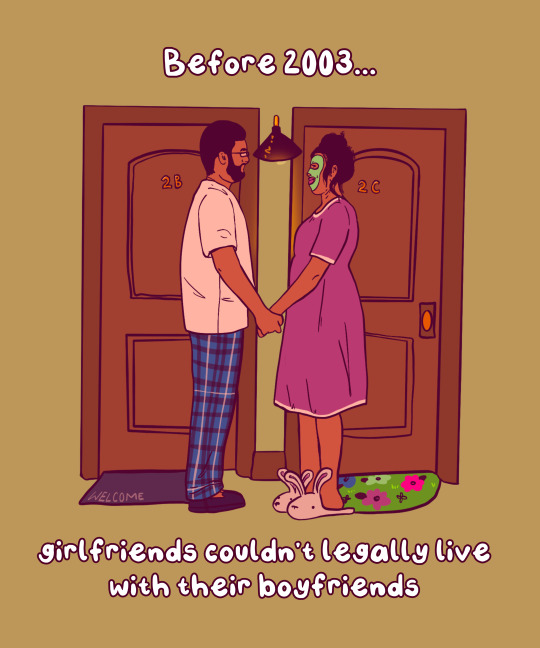
📍 In Lawrence v. Texas (2003), the Supreme Court ruled that anti-cohabitation laws were unconstitutional. Sometimes referred to as the ‘'Living in Sin' statute, anti-cohabitation laws criminalize living with a partner if the couple is unmarried. Today, Mississippi still has laws on its books against cohabitation.
#art#feminism#women's history#women's history month#iwd2024#international women's day#herstory#educational#graphics#history#70s#80s#rights#women's rights#human rights
17K notes
·
View notes
Text

Hunter S. Thompson wrote this a week after 9/11
6K notes
·
View notes
Text
"I believe that humanity is meant to thrive and flourish, and that doesn't happen without context. And the arts and the humanities? They are our vessel for context." - LeVar Burton
#levar burton#humanities#art#music#education#history#national humanities medal#national endowment for the humanities
7K notes
·
View notes
Text
zany to me how these um actually nihilists like to pretend that "um actually love/friendship/cooperation/kindness isn't real bc we evolved that way to benefit ourselves as a species..." um YES? that's also where tool use comes from? that's where cooking comes from? am i supposed to think social bonds & tool use & cooking aren't "real" because they evolved over time instead of appearing fully formed from the ether?
sorry u can't enjoy things. im a superior being twirling a fork in my bowl of delicious noodles whilst staring in adoration at the world
#'love isn't real it's a chemical reaction'#hon i got news for u about chemical reactions and the nature of existence#'we evolved social bonds to benefit ourselves' so you agree?#you agree that social bonds are helpful and important enough that they literally shaped the history of human evolution?#i do not think u are saying. what u think u are saying.
16K notes
·
View notes
Text
Sometimes I think about how we don't know whether caves actually had any particular significance to so-called "cave people", or whether that's just where their art and culture happened to survive for us to see it, and I wonder what disproportionately durable aspect of our present culture is going to give future civilisations entirely the wrong idea about us. I bet it's going to be something really stupid.
4K notes
·
View notes
Text
2,300-Year-Old Plush Bird from the Altai Mountains of Siberia, c.400-300 BCE: this figure was crafted with a felt body and reindeer-fur stuffing, all of which remains intact

This plush bird was sealed within the frozen barrows of Pazyryk, Siberia, for more than two millennia, where a unique microclimate enabled it to be preserved. The permafrost ice lense formation that runs below the barrows provided an insulating layer, preventing the soil from heating during the summer and allowing it to quickly freeze during the winter; these conditions produced a separate microclimate within the stone walls of the barrows themselves, thereby aiding in the preservation of the artifacts inside.
This is just one of the many well-preserved artifacts that have been found at Pazyryk. These artifacts are attributed to the Scythian/Altaic cultures.
Currently housed at the Hermitage Museum.
#archaeology#anthropology#history#artifact#artifacts#siberia#scythians#archeology#museum#amazing#interesting#stuffed animals#ancient history#prehistoric#crafting#felt art#art#prehistoric art#hermitage museum#human nature
71K notes
·
View notes
Text
Reminder to go outside and breathe fresh air and look at the sky. This reminder has come from the corn, which has started talking to me because the midwest is haunted
#The sky has seen all of human history and it will see so much more#It is not the end#There are still beautiful things to look at and beautiful people to look at them with#Uh. The corn told me
4K notes
·
View notes
Text
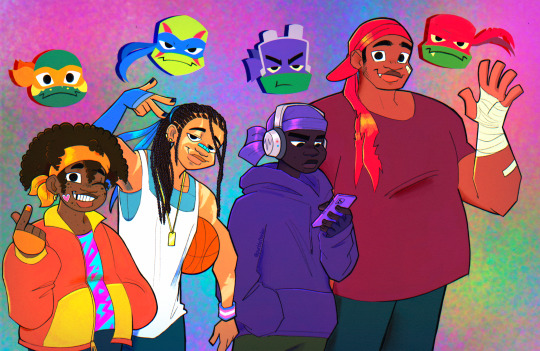
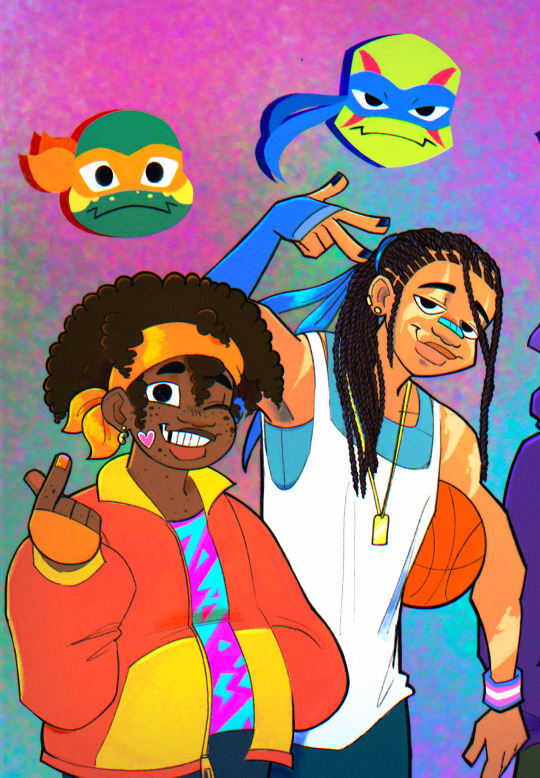
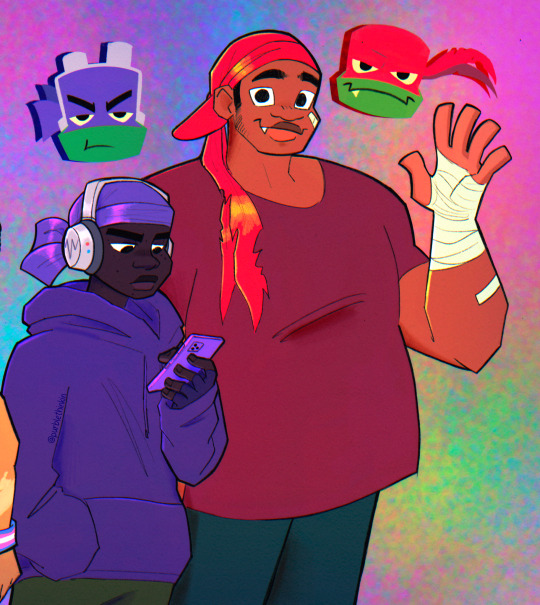
Thought I'd kick off Black History Month by drawing these cool dudes! 🫶🏾 🫶🏽 🫶🏿 🫶🏾
#id in alt text#fan art#rottmnt#rise of the teenage mutant ninja turtles#michelangelo hamato#leonardo hamato#donatello hamato#raphael hamato#rise mikey#rise leo#rise donnie#rise raph#humanization#black history month#artists on tumblr
2K notes
·
View notes
Text

Oldest human footprint discovered, made 153,000 years ago in South Africa.

Oldest human footprint in North America, made 21,000 years ago in New Mexico, USA.
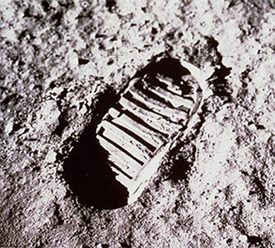
Oldest human footprint on the Moon, made July 20, 1969 on the Sea of Tranquility, Earth's moon.
23K notes
·
View notes
Text









TO RETURN TO MY TREES
“The Overstory” (2019), by Richard Powers; // “Wild Fruits: Thoreau's Rediscovered Last Manuscript” (2001), by Henry David Thoreau; // Kim Novak; // Chinese Proverb; // “To the lighthouse” (1927), by Virginia Woolf; // Santosh Kalwar; // Albert Szent-Gyorgyi; // “Cosmos” (1980), by Carl Sagan; // “Timeline” (1999), by Michael Crichton
#webweaving#web weaving#web weave#webweave#parallels#tree#trees and leaves#trees are cool#humans#humanity#trees and humans#we are trees#history#human race#nature#we are connected#edit#aesthetic#poetry#poem#quote#spilled thoughts#spilled poetry#spilled ink
2K notes
·
View notes
Text
I've been reading some more of the works of eugenicists while thinking about the state of education about this ideology. Yes, "Eugenics" is a dirty word nowadays; in my opinion, it's not nearly dirty enough.
Here's a fact to make your head spin: Eugenics wasn't about killing people. Yes, it ended up killing people, and if you examine the way eugenics has influenced the world, you realize it still does kill people, but the architects of eugenics weren't leading with, "My fellow countrymen, we should On Purpose Kill People."
The reason that's important is, people keep coming up with ideas labeled (by their critics) "uncomfortably similar to eugenics"--- ideas for a compassionate, scientifically-grounded way of improving humanity by understanding the heredity of good and bad traits and influencing the fertility rates of people with different genetic traits.
There is already a word for this kind of idea. That word is: eugenics. It is silly to set yourself apart from eugenicists by explicitly repudiating killing people or forcibly sterilizing them, when many founding eugenicists also explicitly repudiated killing people or forcibly sterilizing them.
Here is an Internet Archive link to "Heredity in relation to eugenics," a work by Charles Benedict Davenport, an early eugenicist. Please read at least the first four pages.
I'm afraid that his brief introduction to eugenics could sound, to the layperson, surprisingly less scary and disgusting than expected. Mister Davenport's word choices may provide a "red flag" to the reader: he refers to human babies as a "valuable crop," to marriage between people as "mating." The disquiet these word choices cause is because they dehumanize the subjects. Humans, from Davenport's perspective, are essentially the same as agricultural plants or animals, which in turn are assets, sources of economic gain---they are things.
Davenport articulates the contribution of a human being to the United States: "...forming a united, altruistic, God-serving, law-abiding, effective and productive nation." However, relatively few people are "fully effective" at this purpose, because a proportion of society is "non-productive"---either criminals or disabled, or among the people required to care for and control criminals and the disabled.
After you read the introduction of Davenport's book, read his wikipedia page. He was a Nazi. He was a Nazi until the day he died. He was rabidly and repugnantly racist, so much so that his later scientific works fudged together garbage conclusions that contradicted his actual data in order to prop up his racist beliefs. He lobbied Congress to restrict immigration into the USA, out of the belief that the immigrants would poison the blood of our country with inferior genetics.
Overwhelmingly, eugenicists were concerned with disability. They believed that disability would normally be eliminated by natural selection, and that caring for the disabled and allowing them to grow up and to have children would cause a steady increase in the proportion of society made up of disabled people---who were, as Davenport puts it, a "burden" on society.
Eugenicists were also concerned with race. They wanted to gather data that demonstrated what they already believed: that race was a biological reality, a reality that could only appear unclear or malleable because of harmful, aberrant, unnatural scenarios, namely miscegenation or race mixing. Basically, race was both a natural reality, and in need of enforcement.
But eugenicist ideology was not just about the inferiority of disabled people or people of color. Eugenicists thought of their ideas as a science and thought of themselves as scientists, and they broadly addressed virtually everything we would now consider a matter of "public health." Eugenicist writings almost universally address crime, and often don't recognize a clear distinction between crime and mental disability, or between either of those things and poverty. Criminals, disabled people and poor people were basically the same; they had something wrong with their genes that made them that way.
"Sexual deviance" is generally included in this, and Davenport explicitly references this in his introduction, where he says that "normal" people are not likely to have the kind of sex that leads to the transmission of STIs.
For many proponents (including Davenport), the key dogma of eugenics was that genes predetermined everything about a person. Tuberculosis was a huge problem at the time, and eugenicists were insisting that, although the disease was known to be bacterial, susceptibility to the disease was genetic, and therefore people who became sick with tuberculosis were genetically defective. Likewise if a child developed epilepsy after a head injury, the injury did not cause the epilepsy but instead revealed an inherent genetic weakness that was already there. This implied that spending resources on healing or rehabilitating anybody was a waste of time.
If you read more of Davenport's book, you will see that he makes some WILD statements---he asserts that artistic talent is a Mendelian trait controlled by a single gene, basically that you are either born an artist or you aren't. This seems absolutely absurd but, there is a good amount of popular belief in inherent aptitudes for art or music or math or what have you.
Eugenics isn't just about named prejudices like racism or ableism, it is even bigger than that, it is a set of beliefs encompassing how the potential and value of human beings is determined and how society should care for its members as a result of that.
2K notes
·
View notes